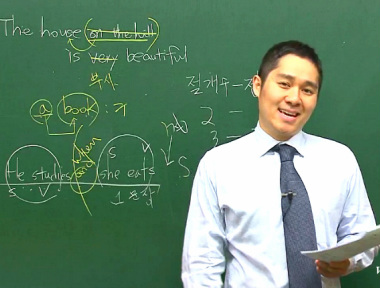TOEFL and a Korean middle school English test are quite different animals. TOEFL is a fairly well-designed test, intended for university level, that seeks to determine a student’s communicative competence in English. TEPS (Korea’s special home-grown English test) and the middle school tests that seem to follow the TEPS lead are not tests of English communicative competence. Instead, what they most resemble is perhaps the types of tests in Greek and Latin that high-schoolers did around a century ago. With frozen idioms and artificial texts, they quiz you on minutiae of grammar and vocabulary and are brutally unforgiving of small mistakes that the TOEFL, by design, essentially ignores.
If a student forgets to write -s on the word “drive” because it happens to be in the third person singular, the TOEFL scorer may take note, but the impact on the final score is minimal as long as the writer’s ideas are clear. In the tests my students take, however, a missed -s can mean a hit to the final score that fails to get one into one of the elite high schools. [July 2014]
I have been, now, on both “sides” of the classroom (as a teacher and as a student [teaching English; studying Korean]) in South Korea, and this kind of atmosphere prevailed in all the places I’ve been. I had one Korean teacher in particular who would run a typical teacher-centered class, but at a snail’s pace because she spent so much time seeming annoyed at the smallest of mistakes and stopping everything to unmercifully slam down on each and every mistake in front of the entire silently-onlooking class. This was really demotivating; people became afraid to say anything for fear of mistakes and public shaming. This is also something explicitly we were told not to do in our ESL teaching certificate program.
Back to TEPS. I never taught much TEPS, but I did teach TOEFL, usually as my main responsibility. Generally, native speakers were not assigned to TEPS classes. And thank God for it as TEPS classes were considered the worst:
|
In TEPS classes, student behavior was worst, motivation lowest. Boring and frustrating. The class boiled down to a teacher browbeating teenagers to inanely memorize a set of highly-abstract, obscure, obtuse rules (the “minutiae of grammar and vocabulary” to which Jared refers above). TEPS classes inevitably become “training for the test” with hardly even the pretense anymore that it’s “studying”, “learning”, or “developing communicate confidence”.
You can get an idea of how TEPS would be particularly aggravating for students and teachers from this sampling of TEPS questions (from here): |

|
* Choose the best answer for the blank.
1. Hours after the storm had passed, the water of the lake still looked dark and _________.
(a) murky
(b) blurred
(c) obscure
(d) faded2. After working __________ hard for years, Mike finally had the director position within his grasp.
(a) crucially
(b) dedicatedly
(c) utterly
(d) identically
* Identify the option that contains an awkward expression or an error in grammar
(a) A: Guess what? I finally won my first tennis tournament!
(b) B: Congratulations! I guess all your practicing really paid off, right?
(c) A: Definitely. I’m that glad I put in those extra hours at the gym.
(d) B: I bet! Now all you need to do is keep practicing and keep winning!
In #1, (a) and (c) could both plausibly be correct. In #2, (b) and (c) might both be right. In the last question, the answer is certainly (c), but there are plausible situations in which even this sentence, as is, might be correct. Consider: “You were shouting really loudly after winning the tennis tournament! Are you really *so* glad you won?” “Definitely. I’m *that* glad I put in those extra hours at the gym!”
Another friend, J.A., who recently moved out of the Seoul area for the first time, has proposed a conspiracy theory: As multiple answers can be right, people with the right connections can be tipped off on which are just “right” and which as “really right”. In other words, it makes cheating easier. I don’t know about this, but I think it’s on the right track. These kinds of tests are perhaps equal parts competence in English and dedication to memorize enough to be able to predict which answers will be correct in certain types of questions. Again, it’s frustrating and seems a bit ridiculous.
Here is a TEPS story I can end with: Around the end of my first month in Korea, one evening back in 2009, the head teacher (who was disgruntled to begin with), teaching a particularly-badly-behaved TEPS class of ninth graders, lost control. The class, as I say, was nothing-but-lecturing about inane questions like the above, and the students were not interested at all. They’d been causing her problems for a long time. That night, after 9 PM, at one provocation, she began yelling; she really let them have it; it was so loud that we heard it far off in the teachers’ room. I think she cried during this episode, as well. Crying in front of students is crossing the Rubicon into serious loss of face. She quit that very night.
(A postscript is that this TEPS-induced abrupt quitting worked out well for me. The woman was replaced by a man., the first male teacher, besides me, at this small institute. This was my first Korean friend, Lee J.S., whom I have, regrettably, lost contact with.)
